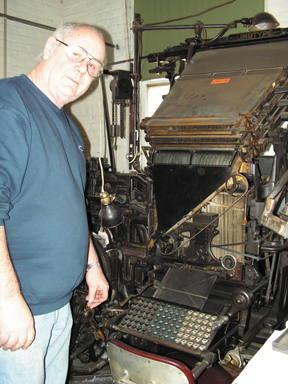In 1929, a man named George Fischer paid $4,600 for a giant linotype machine for his family printing business in Union City.
Now Fischer’s grandson, Ken Fischer, will move the obsolete yet historic one-ton machine – along with the 134-year-old business – to Upstate New York. He said he has been trying to donate the linotype to a museum, but no one has accepted, so he will likely keep it in the family.
Fischer Printing was founded by Henry Fischer, the great-grandfather of the current owner, in the cellar at 208 Jefferson St. in Union City in 1875. For more than 100 years, the Fischer company has been printing business cards, tickets, and everything in between.
Henry’s son George took over for him in 1907 and moved the business to 35th Street in 1921.
“The linotype was his machine,” said Ken last week. He added that George tinkered with it until he was 100 years old. “We weren’t doing anything with it, but he would set type on it and keep it running,” he said.
George’s son Gerard ran the business from 1945 to 1968. It was then that Ken, the current owner, joined the family business.
Sold
Ken recently sold the building at 214 35th St. for $460,000 and made plans to relocate upstate.
“The reality is, it has been my dream to get out of this place for 40 years,” he said. He added that the area has become too congested and that his business no longer requires all the space he has in Union City.
“Now, with the technology, you don’t need all this room, because the machines aren’t as big for what I am trying to accomplish,” said Fischer.
He added that when he was a child, he and his younger sister would help their father at home with leftover proofreading work from the print shop. Together, the three of them would check for incorrect spellings, punctuations, or fonts.
Fischer said that his father worked at the shop until three weeks before he died at age 86.
“He would help where he could help because the world had changed,” said Fischer. “He would cut paper or he’d write checks.”
Fischer said that the family business survived so long because they followed a basic principle.
“If you tell somebody that you are going to do something, it has to be done,” he said.
He added that his father said that if they had to incur extra costs to get the job done right, then that’s what had to be done.
Fischer said that some of his current clients, including Fritz Reuter Lifecare Retirement Community in North Bergen and the sports/theater ticket agency Herman Agar Company in Union City, are the same clients Fischer Printing had 100 years ago.
“We are still a job shop, so you get involved with everything from business cards to little booklets,” said Fischer.
His customers have known for two years that he planned to move, Fischer said, but it won’t change anything. He will still offer the same services, just at a new location.
“UPS has made the world small,” said Fischer. “It doesn’t matter where you are located anymore.”
He will also be able to keep the same 201 phone number.
“My customers down here will call that number and it just jumps to where I am, because we have had this number since they invented the telephone,” said Fischer.
Concern for the machine
Fischer said that when he told his sister he was selling the building, she didn’t ask him what he was asking or whether he had a buyer, but instead, what he was going to do with the linotype.
“We heard about that machine since we were little, little kids,” said Fischer. “There is a lot of emotion tied up in the thing, so you just can’t junk it, and nobody wants it.”
He added that he will probably put it in a corner of the new building he is having constructed for the business in Afton, N.Y.
“It was the technological event of the 19th century,” he said. Before the linotype was invented in 1886, he said, each letter of every word had to be set by hand. The linotype, with the help of a keyboard and molten lead, could cast an entire row of text. The new efficiency helped the business grow.
Death of an industry
Fischer, with no children of his own, said he will not try to sell the business when he retires.
“A small job shop like this is probably not an industry to be in anymore,” he said. “People don’t buy too much one- and two-spot color, red and blue, red and green. Everything is full color because of the technology.”
He added that the local print shops that did not adopt modern technology, specifically the Macintosh computer, gradually died out.
“For a printer from my father’s time and my grandfather’s time, the [printing] machine was a life investment,” said Fischer. He added that that is why he still has machines that are more than 60 years old. But modern computers, he said, become obsolete after only a few years.
Amanda Staab can be reached at astaab@hudsonreporter.com.
